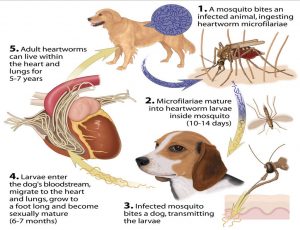
Heartworm surgery.
From Heartworm Society https://www.heartwormsociety.org/newsroom/in-the-news/205-fidose-of-reality
Heartworms kill a great number of dogs. In fact, the American Heartworm Society reports that more than one million dogs currently have heartworm disease. They also report that heartworm is a serious canine and feline health concern that threatens animals in all 48 contiguous states and Hawaii, as well as throughout the temperate regions of the world. April is Heartworm Awareness Month.
How Are Heartworms Spread?
Heartworms are spread from animal to animal by mosquitoes and live in the heart and pulmonary arteries of infected animals. The disease can lead to heart failure, as well as damage to other organs. I work with a lot of different Cocker Spaniel rescue groups, and this is a topic near and dear to my heart. Many heartworm positive dogs are relinquished to shelters and rescue. This is a preventable disease. Some folks have first hand knowledge of this disease and they act on it. Such is the case with 15-year-old Annie Blumenfeld from Connecticut. Sometimes it takes a young person to make a nation perk up and listen. With Annie, this is the case. Here’s the scoop and an interview she gives to Fidose of Reality.
A Rescue Dog Inspires
“About two years ago my family rescued our dog, Teddy, from Houston, Texas. It was discovered he had a serious case of heartworm disease,” Blumenfeld says. “He was left inactive in a crate for two months, with many vaccinations,and x-rays. It broke my heart to see that he could not simply understand why he was in his situation and that he could not play with any of his other friends. It was such a painful, expensive, and long process that could have been easily avoided with a monthly preventive.”
Since Annie saw her dog suffering, she did some investigating and found out that not only do one million dogs in the U.S. have heartworm, but 45 percent of our dogs are unprotected. It is a disease also present in Canada, Africa, Australia, and the United Kingdom.
Taking matters into her own hands, this teenage warrior founded a nonprofit organization called Wags 4 Hope. Through the organization, Blumenfeld is able to channel her love of painting with her passion for helping animals.
But the happily ever after doesn’t end there. In fact, this is where the Annie’s journey begins.
Talking to The Government
Blumenfeld is current working with Connecticut State Representative, Tony Hwang, on a bill for heartworm disease education in all the pet stores and shelters in Connecticut. She recently presented her bill to the Environmental Committee in Hartford, which is a really big deal. Only three percent of bills are accepted for public hearing, and Fidose has the video: https://www.youtube.com/watch?v=mk_dqtB7z7c
Talking to Your Dog’s Veterinarian
The American Heartworm Society is also very clear about alternative therapies for this disease. Blumenfeld is adamant in sharing that there are no “natural” or herbal therapies proven to be safe and effective prevention or treatment for heartworm disease.
“It is very important that pet owners speak to their dog’s veterinarian to make sure their dog is tested before beginning any preventative. Your dog can get very sick if they carry the parasite,” she shares.
She stresses year-round protection is imperative and to talk to your dog’s vet, of course.
Annie’s Future
She loves to paint and says she will always continue her mission for helping animals. She is very interested in business and having recently proposed my bill to the Connecticut Legislative Committee, politics is also of great interest to her. Judging by the headline she received from the New York Daily News, her future is definitely bright.
How You Can Help
Fidose encourages you to LIKE the Wags 4 Hope Facebook page so that together, we can continue to help animals. To learn more about heartworm disease, check out the American Heartworm Society’s page. Annie’s nonprofit organization is Wags 4 Hope.
Is your dog protected from heartworm disease?
From the AKC
Heartworm Awareness Month: 5 Things to Remember From AKC’s Chief Veterinary Officer
April is National Heartworm Awareness month, but not every dog owner is well versed in the potentially deadly parasite. It’s only transmitted by mosquitos, which pick up larval heartworms — called microfilaria — circulating in the bloodstream of an infected animal. Dogs with heartworm can be treated, but the best approach to the parasite is prevention.
Here at the AKC, the health and wellness of dogs is engrained in our mission. To help owners protect their pups, we talked to our Chief Veterinary Officer, Dr. Jerry Klein, who gave us these five things to remember:
- The American Heartworm Society and many veterinarians recommend year-round preventative medication due to it being found in all 50 states.
While the prevalence of heartworm historically has been high in the South, the American Heartworm Society reports that it’s on the rise throughout the U.S. This increase includes regions that were once considered “non-endemic.” Even if you don’t live in an area where heartworm is prominent, you still want to talk to your veterinarian about preventative medication for your dog.
- Heartworm disease can cause lasting damage to the heart, which can affect a dog’s health and quality of life — just one of many reasons to have your dog on preventative medication.
Heartworms mature after six months and can live in your dog’s body for seven years, constantly producing offspring. After about a year, a dog may harbor hundreds of these worms, although the average is 15. The worms cause inflammation and damage to the heart, arteries, and lungs.
- Heartworm preventative medication can only be obtained from a veterinarian or with a veterinarian’s prescription through a pet pharmacy, so start the conversation early.
There are many different preventatives available, some that are chewable, some that are topical, and some that also prevent other parasites. Talk to your veterinarian about which preventative is right for you and your dog.
- Certain heartworm preventative medications can protect against many intestinal parasites.
Again, certain preventatives can protect against other parasites such as roundworms, hookworms, fleas, and tapeworms. Your veterinarian will know the differences between the types of preventatives and can help you choose the right one.
- The recommendation from the American Heartworm Society is to have all dogs tested for heartworm every 12 months, even those already on heartworm preventative medication.
Have your veterinarian test your dog for heartworm during your annual visit.









